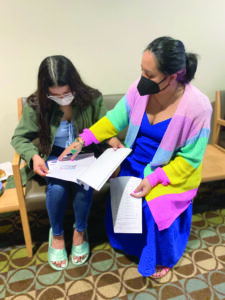NORTH TEXAS GIVING DAY
By Maryam Baig
What happens when a lawyer and social worker envision assistance for vulnerable immigrants and refugees in fear of losing their lives to human rights violations? What if those migrants and refugees had no financial cushion, no assets? What if they had families in need of protection?

Photos by Maryam O. Baig
The entire village had gathered. My mother was crying. The village elder came towards me, with a jagged piece of glass. They had done this to a girl the year before. I remembered her screams. (SR, an FGM-related client, granted her Green Card through HRI in 2022)
Human Rights Initiative of North Texas (HRI), fueled with the vision of its founders, Betsey Healy and Serene Simmons Connelly, and dedication of its earliest pro bono lawyers and social workers, opened its doors in 1999, receiving its 501(c)3 status in 2000. HRI provides free legal and social services to immigrant survivors of human rights abuses. Their clients are eligible to apply for legal status under humanitarian provisions of U.S. immigration law and policy. They are asylum seekers fleeing persecution; unaccompanied children who have been abused, abandoned or neglected; and survivors of domestic abuse or violent crime eligible under the Violence Against Women Act and U-Visa statute, respectively.
The crowd surged, and I could see some people get crushed under the feet of others. I’m a nurse. I ran against the bodies, to help those who had fallen. They arrested me for trying to help. (TS, an asylum client who received his Green Card through HRI in 2020)
Providing 100 percent free legal services, HRI concentrated its legal efforts on the most vulnerable refugee demographic, eventually expanding into three different areas: legal services, social services and community education and advocacy. The social services program served more than 1,500 clients last year, the volunteer department has fortified a network of more than 300 pro bono lawyers and other volunteers, and HRI’s advocacy program enables clients to become leaders who spearhead initiatives in healthcare and pathways to citizenship.
We hadn’t heard from my father, who had gone to Texas to find work, and then my mother disappeared. The gang in my city threatened to rape me and my cousin. To get away, I got on a bus next day, and it crossed the border into the United States. (SR, an SIJS client, whose green card was confirmed through HRI in 2019)

The money raised from North Texas Giving Day, which will take place on Sept. 22, will allow Human Rights Initiative to assist clients in three areas: a terribly troubled immigration system creating long backlogs to receive employment authorization and anguishing delays in legal cases; the disproportionate impact of the pandemic on immigrants; and the present inflation that is causing rental costs to increase. To give, go to northtexasgivingday.org.
He wouldn’t let me leave the house, and the occasional slap or push had turned into long beatings. When he left for work, he’d tie me to the foot of the bed, and left a tub of yogurt on the floor for me to eat. When he had married me back home, he had promised to love me. (SB, a CVP client who received her green card through HRI in 2018)
HRI’s founders had a crucial insight: if you want to make a positive and lasting change in the lives of immigrants, you must provide accessible legal services. At the same time, the vulnerable populations HRI serves cannot meaningfully participate in the legal process while their fundamental human needs are not met. For that reason, HRI believes that clients deserve the very best and should receive the highest quality legal and social services. Because of this, clients are usually successful in obtaining legal status — and that status is the key to the moving on to become great contributors to themselves, their families and the community.
At the closing appointment for her green card, we explained how we gather information about the outgoing client. We told her that if we photograph her, we can hide her name, her face, whatever she wishes. She made a simple request: she wanted to protect details about her case but wanted to be named. “I’m not an anonymous person,” she told us. “Call me by my first name. I’m not a nobody.” (Carmela, who received her green card through HRI in 2022.)
Help HRI help more people by giving to HRI this North Texas Giving Day.
